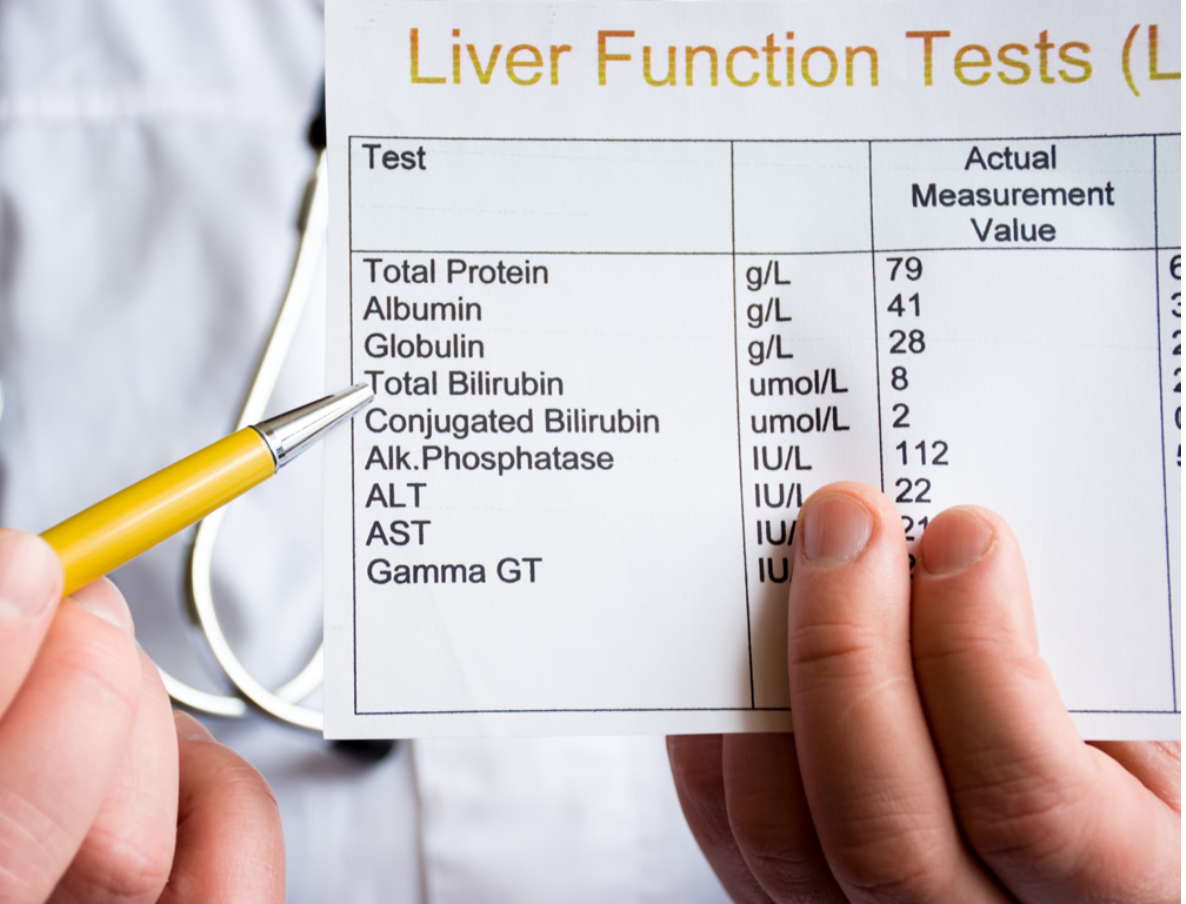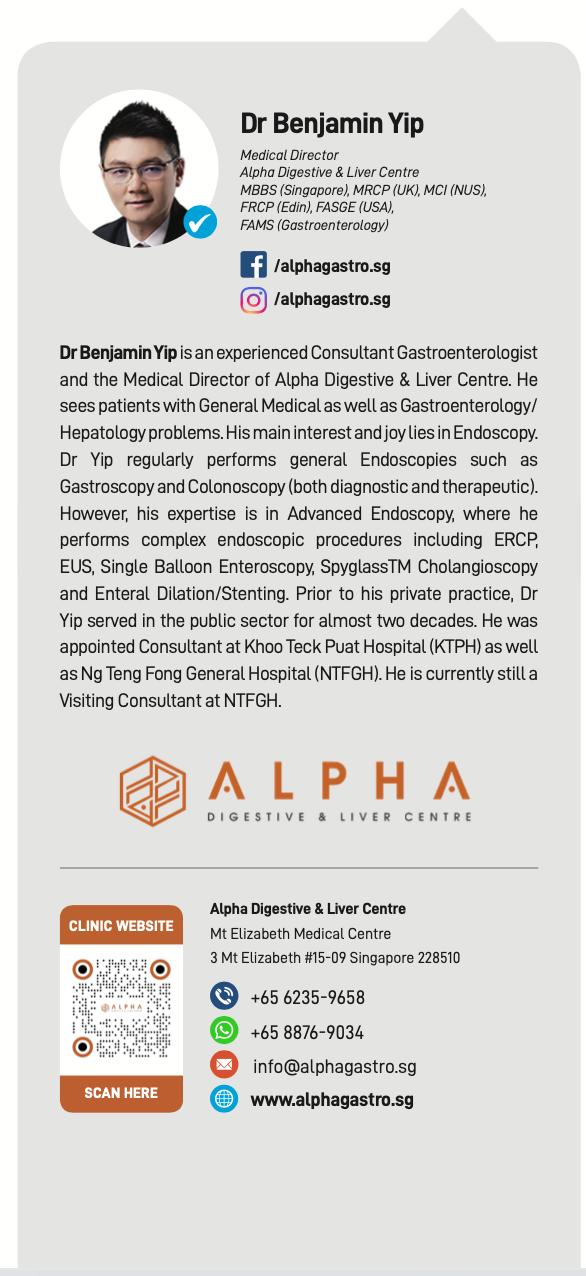Can Alcohol Cause Liver Cancer?
Dr Benjamin Yip

The liver is the largest solid organ in the body and is well known for its function of detoxification, metabolising toxic substances like alcohol and drugs. But this essential organ actually does much more than that. It is a powerhouse of over 500 vital functions, including bile production, regulation of bloodclots, the processing of glucose, and storage of vitamins and minerals. Thus, care for our liver is crucial.
While most people are familiar with commonly talked-about cancers (such as those of the lung and stomach), liver cancer is actually quite a common type of cancer as well. In Singapore, liver cancer is among the top five most frequently diagnosed cancers in Singapore. It has the third highest number of cancer deaths at 12.9%.
This begs the question: Does an alcohol-heavy lifestyle heighten our risk of getting liver cancer? I will nowtake a deep dive into the subject of liver cancer and liver health.
WHAT IS LIVER CANCER?
Liver cancer refers to cancer that starts from the cells of the liver. Normal cells in the body divide and reproduce in a controlled and orderly manner, producing new cells and replacing old ones. Sometimes, this process is disturbed, and the normal process of cell division gets disrupted. These cells can growrapidly and proliferate, creating masses or lumps. These are also known as tumours.
Tumours are either benign (i.e. not cancerous) or malignant (i.e. cancerous). Malignant tumours have the potential to grow further at rapid rates and spread to other parts of the body.
In liver cancer, these mutations can arise from chronic inflammation resulting in cirrhosis or hardening in the liver. This can be due to viruses such as hepatitis B and C; toxins such as alcohol and drugs; metabolic injuries such as steatohepatitis (NASH) and Wilson’s disease: and rarer conditions affecting the liver, such as autoimmune conditions including autoimmune hepatitis, primary biliary cholangitis and primary sclerosing cholangitis.
TYPES OF LIVER CANCER
There are many types of malignant liver tumours, and they can be either primary (originated from the liver) or secondary (cancers from another source that have spread to the liver).

Primary liver cancer is also known as hepatocellular carcinoma (HCC). HCC is the 4th most common cancer among men in Singapore. On the other hand, cholangiocarcinoma (bile duct cancer) occurs in the ducts that drain bile from the liver to the small intestine.
The other type of liver cancer is metastatic/secondary liver cancer, which occurs when cancer that originates from elsewhere in the body spreads to the liver.
SYMPTOMS
In its early stages, liver cancer usually does not have any symptoms. However, as it advances, the following symptoms may present:
- Loss of appetite and weight loss
- Lethargy
- Generalised weakness
- Abdominal bloating/swelling
- Yellowing of the eyes and skin (jaundice)
- Pale stools and dark-coloured urine
- Feeling a mass in the right upper abdomen under the ribs
- Vomiting
- Feeling enlarged and distended veins on the abdomen that are bluish-green
If you experience any of these signs or symptoms, please consult your doctor immediately.
RISK FACTORS
The more risk factors someone has, the greater the chance of that person developing liver cancer.
Primary liver cancer is mainly due to liver cirrhosis of which there are certain risk factors, including:
Chronic liver infection with hepatitis B and hepatitis C
Hepatitis B and C are the most common causes of primary liver cancer. There are many ways one could transmit or contract these infections, including from a mother to a baby during pregnancy; contact with infected bodily fluids such as saliva, blood, and sperm; and/or via intravenous drug use.
Having chronic hepatitis B and/or C makes an individual a hundred times more likely to get HCC.
Having these conditions also increases the risk of liver cancer as it damages the liver through chronic inflammation, leading to liver cirrhosis.
Excessive alcohol consumption
Repeated and excessive alcohol abuse can lead to liver cirrhosis, which predisposes one to liver cancer. Liver cirrhosis is an irreversible condition in which liver cells become replaced with scar tissue. Liver function gets severely affected by cirrhosis because healthy and functioning liver cells are replaced with scar tissue. The liver also shrinks as a result.
Cigarette smoking
Smoking may also accelerate the progression and severity of liver disease, especially for those who suffer from liver fibrosis or cirrhosis.

Fatty Liver Disease – Non-Alcoholic Fatty Liver Disease
(NAFLD) and Non-Alcoholic Steatohepatitis (NASH)
NAFLD can occur in patients with diabetes and obesity, even though there are also many patients who are not obese. NAFLD occurs in about half of the adult population in Singapore. It can progress to NASH, liver cirrhosis and HCC. NAFLD and NASH are becoming increasingly common in Singapore and across the world.
Autoimmune Liver Conditions
Autoimmune liver conditions include the following:
> Autoimmune hepatitis (AIH)
A liver condition where our antibodies attack healthy liver cells, causing serious liver damage.
> Primary biliary cholangitis (PBC)
A progressive liver disorder where the bile ducts in the liver are slowly being destroyed by the body’s own antibodies.
> Primary sclerosing cholangitis (PSC)
A long-term progressive inflammation and fibrosis of the bile ducts.
Exposure to aflatoxins
Aflatoxins are harmful food contaminants made by moulds.
Genetic/metabolic conditions
These conditions include Wilson’s disease, haemochromatosis and alpha -1 antitrypsin deficiency.
TREATMENT
Liver cancer is treatable. However, this largely depends on a variety of factors, such as the size and type of liver cancer, its location, and if it has spread. If detected early, the affected portion of the liver can be removed via surgery.
If you do experience any symptoms of liver cancer, it is important to consult your doctor for a proper diagnosis. They will work with you to plan a course of treatment that best suits your condition.
PREVENTION
There is no surefire way to prevent liver cancer. However, there are certain lifestyle changes that one can adopt to lower the risk of liver cancer. These include:
Getting vaccinated against hepatitis B
Children can now be immunised against hepatitis B at birth.
This hepatitis B vaccine is available for adults too.
Living a healthy lifestyle
This can help reduce your risk of obesity and diabetes, as well as reduce your chances of developing fatty liver. Healthy habits include regular exercise and eating a healthy diet.


Drinking in moderation
Chronic alcohol use is a risk factor for developing HCC, especially when consumed in large amounts.
Going for regular liver cancer screening
Screening is recommended for patients who are at risk of liver cancer, especially those with liver cirrhosis.
Screening includes a blood test and an ultrasound scan of the liver every six months.

ALL ABOUT MODERATION
In short, long-term and excessive alcohol consumption has been linked to an increased risk of liver cancer.
This is because heavy alcohol use can damage the liver, causing fatty liver disease (the build-up of fat cells
in the liver) or liver cirrhosis (the formation of liver scar tissue). This damage, in turn, raises your risk of liver cancer.
Ultimately, as with all things, it is all about moderation. For alcohol consumption, the Health Promotion Board (HPB) recommends two standard drinks a or less a day for men; and for women, one standard drink or less day.
In fact, contracting hepatitis B is the leading risk factor for liver cancer. Thus, it is important to take note of and manage other modifiable risk factors (such as hepatitis B) for your liver health. Focus on vaccination against hepatitis B, avoid heavy drinking, maintain a healthy body weight and go for regular liver-related screening.
Although HCC is mainly caused by liver cirrhosis with various causes, two conditions can cause HCC without the liver having to go through liver cirrhosis first. The two conditions are hepatitis B and fatty liver. This is why patients with hepatitis B or fatty liver disease are advised to undergo a thorough evaluation by their gastroenterologist to minimise the risk of developing HCC.

Dr Benjamin Yip
Alpha Digestive & Liver Centre
www.alphagastro.sg
Mt Elizabeth Medical Centre
3 Mt Elizabeth #15-09 Singapore 228510
PRIME











